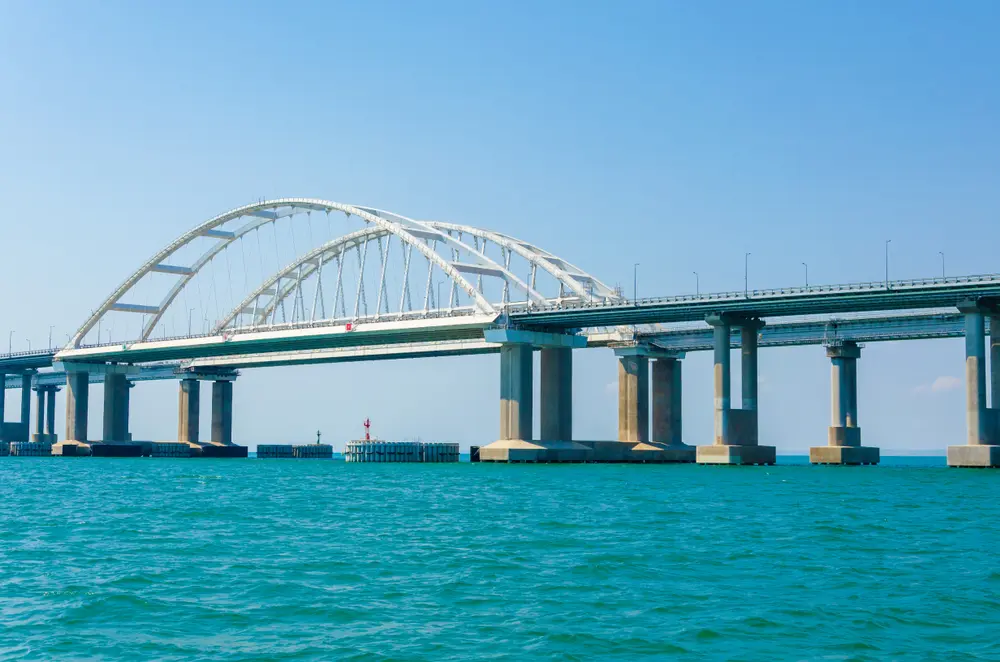
According to Russian news agency TASS, freight and passenger rail traffic has resumed over Kerch bridge. The bridge, connecting mainland Russia to the Crimean peninsula annexed in 2014, had been sabotaged by suspected Ukrainian forces early Saturday. On Sunday morning, divers were dispatched to inspect the structure.
In the early morning, at 6 a.m. local time on October 8th, a huge blast rocked the Kerch Strait and damaged its 12-mile-long bridge’s infrastructure, thereby causing a temporary disruption of traffic. Three people perished in the explosion.
Closer look at the collapsed road span of the Crimean bridge pic.twitter.com/ZW1OOAKdns
— OSINTtechnical (@Osinttechnical) October 8, 2022
Analysts suspect it could either have come from a detonated truck rigged with explosives or a missile strike. The Kremlin holds to the former theory, and has vowed retaliation. Soon after, Russian president Vladimir Putin, who only one day before the event had celebrated his 70th birthday, signed a decree to tighten security measures for the bridge.
Russia’s National Anti-Terrorism Committee released a statement that said that due to the blast, two spans of the road bridge had partially collapsed, but that the arch spanning the channel through which ships travel between the Black Sea and Azov Sea was not damaged.
The bridge, a source of pride for Putin, who inaugurated its road section in 2018, is a vital artery of the Russian war effort, as it transports troops and military equipment to its forces fighting in Ukraine’s South.
In a video address on Saturday, Ukrainian President Volodymyr Zelensky did not refer to the blast specifically; he merely commented that the weather in Crimea was cloudy, no doubt referring to the billows of smoke resulting from the fires.
“But however cloudy it is, Ukrainians know … our future is sunny,” he added. “This is a future without occupiers, across our territory, particularly in Crimea.”
Kyiv, then, has claimed no direct responsibility, though some have playfully hinted at its involvement, as evinced by a video posted to Twitter by the head of Ukraine’s National Security and Defence Council, Oleksiy Danilov.
The video shows a split screen, one side showing the damaged bridge, the other a fragment of Marilyn Monroe’s famous birthday song to U.S. president John F. Kennedy.
Доброго ранку, Україно! 🇺🇦 pic.twitter.com/UQMI6LheSR
— Oleksiy Danilov (@OleksiyDanilov) October 8, 2022
One unnamed Ukrainian official, however, briefed The Washington Post that Ukrainian special services were behind the act, considered by Moscow to be an act of terrorism. As the bridge connects to Crimea, which before a 2014 referendum was under Ukrainian control, Kyiv considers it to be an ‘illegal construction,’ and thereby a valid target.
Mykhailo Podolyak, an adviser to Ukrainian President Volodymyr Zelensky, posted a message of his own on Twitter saying the incident was just “the beginning.”
Crimea, the bridge, the beginning. Everything illegal must be destroyed, everything stolen must be returned to Ukraine, everything occupied by Russia must be expelled. pic.twitter.com/yUiSwOLlDP
— Михайло Подоляк (@Podolyak_M) October 8, 2022
“Everything illegal must be destroyed, everything that is stolen must be returned to Ukraine, everything occupied by Russia must be expelled,” he wrote.
After the assassination of political philosopher Aleksandr Dugin’s daughter Darya Dugina in late August, the act of sabotage marks the latest escalation in the now eight-month-long Russo-Ukrainian war.
As the bridge is now seemingly back in operation, it is doubtful whether Moscow will experience much impediment to their war’s prosecution. However, to Ukraine, it is both a symbolic and political victory, as it helps to raise confidence in its western backers—already significantly buoyed by recent Ukrainian military victories.
